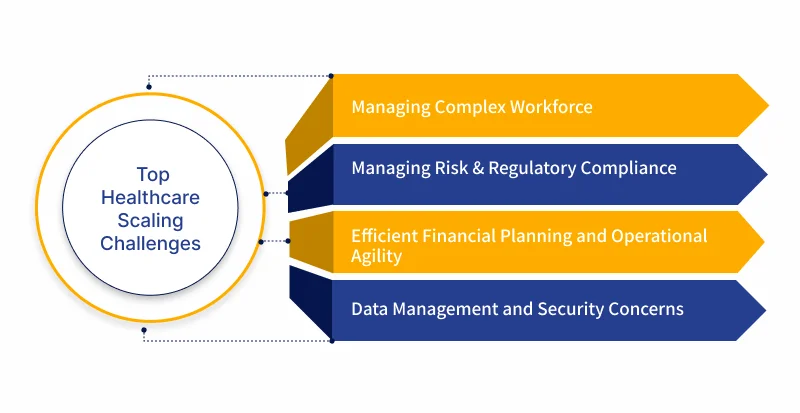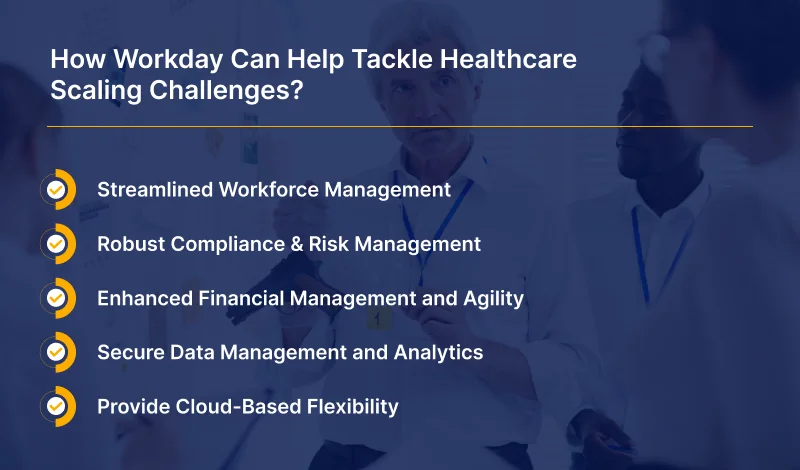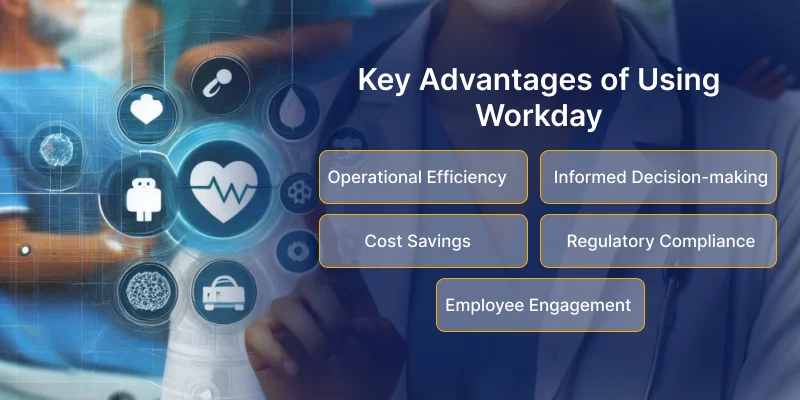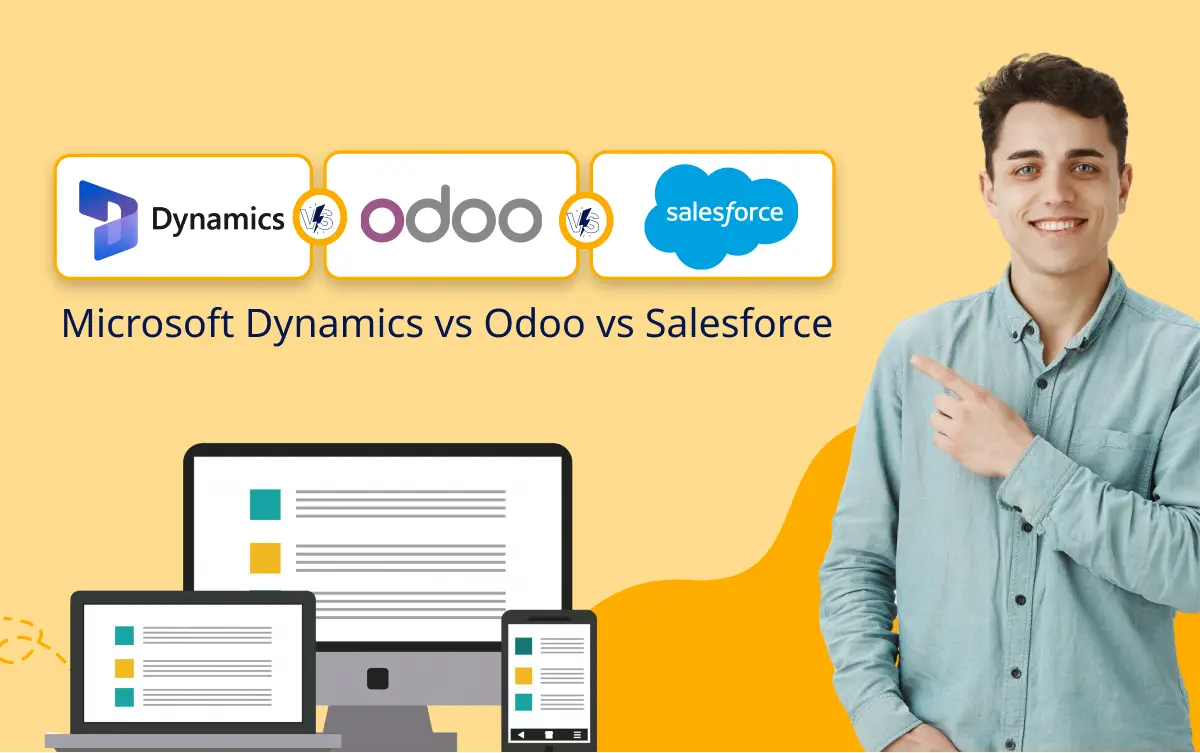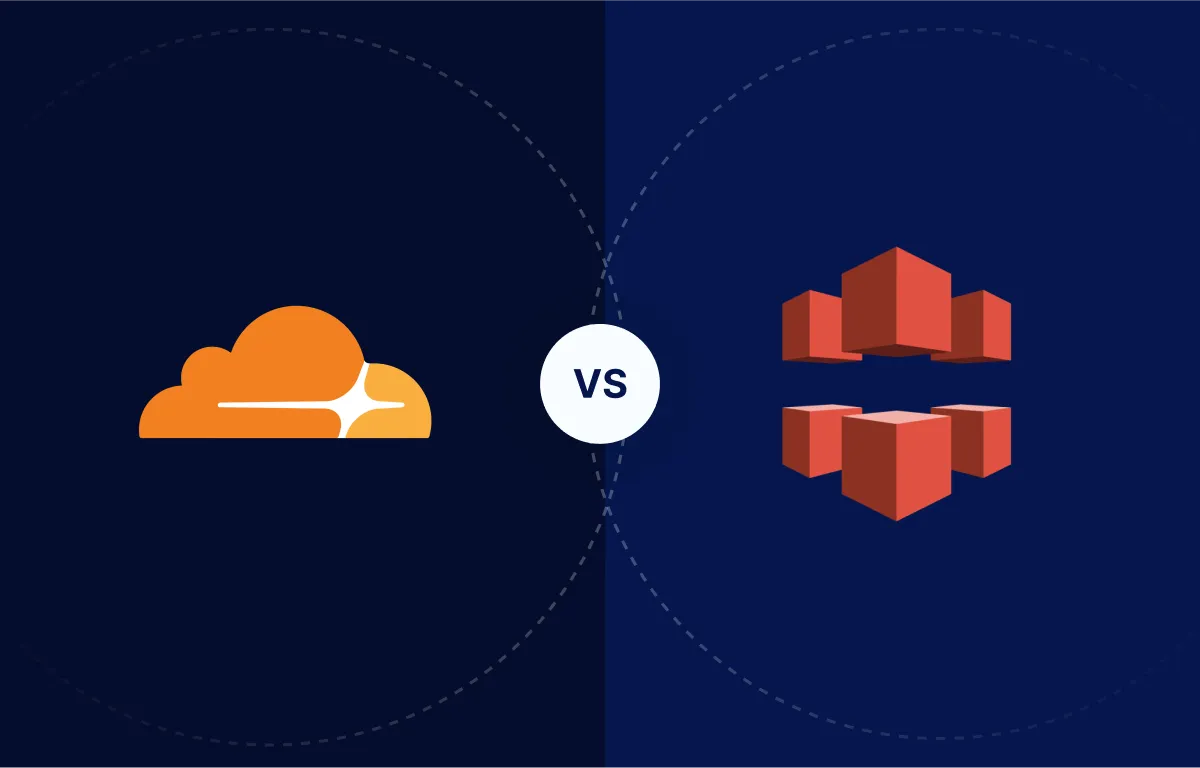Did you know the World Health Organization estimates a global shortage of 10 million health workers by 2030?
Growing patient demands, the need for seamless workforce management, and regulatory complexities make it difficult for healthcare organizations to scale efficiently in this competitive business era.
As healthcare providers strive to expand their operations while maintaining good quality, they require a unique solution to simplify these complexities. Workday provides the scalability and flexibility they need to adapt and thrive.
Here, you will explore how Workday healthcare solutions help healthcare organizations scale efficiently by improving compliance, optimizing healthcare systems, and enabling agile growth in a fast-evolving industry.
The Growing Challenges in Healthcare Scaling
Healthcare organizations are facing several challenges across the world. These challenges reduce their ability to scale efficiently.
Some of the top difficulties faced by various healthcare organizations in scaling their operations are given below:
1. Managing Complex Workforce
A report by U.S. Nonfarm Labor Cost revealed that the cost of labor increased to 121.98 points in the third quarter of 2024, reaching an all-time high.
We know that healthcare organizations often face the challenge of managing a diverse and growing workforce. As organizations grow, the following things become increasingly complex.
- Coordinating varying shift schedules
- Ensuring staff qualifications
- Maintaining optimal patient-to-staff ratios
Meeting the workforce demands efficiently is critical to providing quality care while keeping operational costs in check. Let’s have a look at the demands listed below:
- Ensuring proper staff-to-patient ratio
- Tracking employee certifications
- Managing payroll
Impact of the Challenge
Staffing inefficiencies and high turnover rates could lead to significant operational costs and negatively affect patient healthcare quality.
We help you with innovative approaches to managing supply chain costs in healthcare.
2. Managing Risk & Regulatory Compliance
According to the Hippajournal August report, the average healthcare data breach size in 2024 is currently 119,487 records, and the median breach size is approximately 4,109 records.
When an organization scales, it becomes difficult to stay compliant with the changing regulations. The healthcare industry is one of the most regulated sectors. It comes with strict laws governing the following aspects:
- Patient privacy
- Data security
- Workplace safety
Not meeting the compliance standards causes costly penalties and reputational damage to the organizations.
Hence, risk management becomes a growing concern as expansion increases exposure to potential legal and operational risks. Healthcare providers need to have robust systems.
Impact of this Challenge
Non-compliance not only leads to financial penalties and risks but also reputational damage, which could destroy patient trust.
Read More – Digital Transformation Essentials for Modern Businesses
3. Efficient Financial Planning and Operational Agility
Scaling healthcare operations requires careful financial planning to allocate resources effectively. However, managing the financial issues of a growing organization can take time and effort. This includes:
- Budgeting
- Forecasting
- Cost management
According to McKinsey report, the healthcare profit ratio will grow at a CAGR of 7%, from $538 billion in 2022 to $819 billion in 2027.
Therefore, it is necessary for healthcare providers to balance growth with cost control. This should be done while maintaining operational agility to respond to:
- Changing market conditions
- New healthcare policies
- Patient demands
Impact of this Challenge
Ineffective financial management could further lead to resource constraints, limiting an organization’s ability to invest in growth and innovation.
4. Data Management and Security Concerns
As healthcare organizations grow, so does the volume of data they handle. Managing the following type of data becomes a significant challenge, especially when ensuring accuracy and security.
- Sensitive patient data
- Financial data
- Operational data
With cyber threats rising, healthcare providers must prioritize data protection and implement strong security measures to safeguard against breaches.
Additionally, efficiently accessing and analyzing data is crucial for making informed decisions that support organizational growth.
Ensure regulatory compliance in healthcare operations with our powerful monitoring tools.
How Workday Addresses Healthcare Scaling Challenges?
Workday offers a comprehensive suite of tools that directly handle the problems affecting healthcare scalability. Here’s how:
1. Streamlined Workforce Management
Workday enhances workforce management and scheduling by focusing on automation and talent management.
This enables organizations to minimize staffing inefficiencies and improve employee satisfaction, positively impacting patient care.
Workday’s Human Capital Management (HCM) system centralizes employee data and automates HR processes.
- The advanced scheduling feature helps automate shift planning and ensures optimal staff allocation based on qualifications and availability.
- Talent acquisition and retention help enhance recruitment processes and provide career development resources to reduce turnover.
- Workday provides automation to help organizations avoid costly or critical understaffing during peak times.
- It offers tools for tracking employee performance, career development, and engagement, which will help retain the top talents.
2. Robust Compliance & Risk Management
Workday helps minimize the risk of non-compliance penalties and maintains patient trust through robust data security measures.
It supports compliance and risk management by keeping healthcare organizations audit-ready and compliant with industry regulations.
Workday provides tools to monitor regulatory changes and maintain compliance across all operations.
- Automated compliance updates keep policies and workflows current with evolving regulations.
- Workday simplifies tracking employee certifications, licenses, and training requirements by centralizing compliance data.
- Audit trails and reporting not only make compliance reporting easy, they also prepare an organization for audit.
- The audit-ready reporting tools minimize the risk of non-compliance penalties and reduce the time and effort spent preparing for regulatory audits.
Read More – 5 Ways Workday Solves the Biggest Enterprise Business Challenges
3. Enhanced Financial Management and Agility
Workday improves budgeting accuracy and resource allocation. This also enables organizations to adapt quickly to changing conditions.
Workday offers financial management tools. These tools provide real-time insights and automate financial processes.
- Workday healthcare analytics provides up-to-date financial data, which guides an organization in making informed decisions.
- Automated processes help streamline accounting, payroll, and expense management.
- Healthcare providers can adjust their financial strategies easily as per the changing conditions.
- Using automation, Workday enhances accuracy and efficiency, helping healthcare organizations streamline financial operations.
4. Secure Data Management and Analytics
Workday provides safeguards against data breaches and uses data for strategic planning. These solutions ultimately improve patient care and internal efficiency.
Workday ensures data integrity and security while offering powerful analytics capabilities.
- Data encryption and security protocols help protect sensitive information against cyber threats.
- Real-time reporting facilitates better decision-making by providing up-to-date and actionable insights.
- Predictive analytics uses AI and ML to forecast healthcare trends and resource needs. It also enables proactive planning.
5. Provide Cloud-Based Flexibility
Workday’s cloud-based flexibility focuses on its ability to scale with growing healthcare organizations and integrate seamlessly with other essential healthcare systems.
Workday cloud for healthcare allows organizations to scale seamlessly as they grow. Here is how:
- Whether expanding to new locations, increasing staff, or adding new services, Workday adapts without requiring significant changes in IT infrastructure.
- The platform supports healthcare providers in managing growing data volumes, employee numbers, and operational complexity.
- Its scalability ensures organizations can continue expanding without experiencing slowdowns or operational inefficiencies.
Learn how Workday can help you grow without operational disruptions.
Top Benefits of Workday Healthcare Solutions
Workday integrates Human capital management, financial management, and data analytics into a single platform. Its cloud infrastructure ensures that healthcare providers can scale and adapt quickly to industry changes without feeling the burden of managing complex IT systems.
By unifying data and processes across departments, Workday enables healthcare organizations to operate more efficiently, paving the way for sustainable growth.
Workday healthcare solutions provide healthcare organizations with some amazing advantages as discussed below:
1. Operational Efficiency
Most of the manual processes, such as Workday healthcare payroll solutions, scheduling, and workforce management, are automated in Workday.
This reduces administrative overhead and helps healthcare providers focus more on patient care rather than back-office tasks.
Automation ensures more effective and fast execution of routine operations. It further helps in boosting organizational productivity.
2. Informed Decision-making
One feature that stands out about Workday is the delivery of real-time data insights. Healthcare leaders now have access to comprehensive analytics supported by informed decision-making through financial, operational, and workforce systems.
Whether tracking performance metrics or forecasting resources, Workday ERP healthcare solutions help organizations make better strategic choices.
3. Cost Savings
Effective workforce management is critical across all healthcare organizations. High staff capacity must be balanced against patient needs while controlling costs.
Workday’s workforce planning tools optimize staff scheduling, minimize overtime, and provide better resource allocation.
These capabilities further provide excellent cost-saving prospects through eliminating wasteful expenses and a proper balance of manpower.
4. Regulatory Compliance
The healthcare industry is strictly regulated; nothing beats maintaining compliance to avoid penalties. Workday simplifies compliance with several built-in tools for tracking and reporting regulatory requirements, audit trails, and certifications.
This reduces non-compliance risk while ensuring the organization is prepared for audits or policy changes.
5. Employee Engagement
Employee engagement is an important talent retention behavior in healthcare. Workday ERP Healthcare empowers employees by giving them more control over their schedules, benefits, and careers from any device.
The mobile-friendly interface ensures that healthcare staff are always connected and engaged for better job satisfaction and reduced turnover with healthcare app development.
Manage complex billing workflows seamlessly with our Workday’s healthcare financial tools.
Workday Core Capabilities for Healthcare
Workday healthcare solutions offer comprehensive features that streamline operations and help organizations scale efficiently via healthcare IT consulting:
HR & Payroll Management
Workday simplifies healthcare organizations’ human resources and payroll management by providing a unified system that automates key workforce operations.
Healthcare providers can manage staffing schedules, track employee certifications, and handle payroll without feeling the administrative burden. This saves time and allows HR teams to focus on strategic initiatives like talent development and employee engagement.
Financial Management
Workday healthcare solutions streamline budgeting, accounting, and financial reporting processes. This gives healthcare leaders a comprehensive view of their financial health.
With real-time insights into expenses, revenue, and cash flow, healthcare providers can make more informed decisions that align with their growth strategies.
Workday also integrates with other systems, allowing for seamless financial planning, resource allocation, and cost management, essential for efficiently scaling operations.
Supply Chain Optimization
Workday optimizes the supply chain by automating inventory tracking, procurement, and vendor management. This ensures that healthcare organizations can efficiently manage inventory levels, avoid shortages, and reduce waste.
Workday provides real-time visibility into supply chain operations, helping organizations control costs, maintain regulatory compliance, and improve overall operational efficiency.
Read More – Top Automation Tools to Streamline Your Workflow
Case Studies/Success Stories
The following five healthcare organizations have successfully utilized Workday healthcare solutions to enhance efficiency. Have a look at these case studies below:
1. Mayo Clinic
It faced difficulties managing a growing workforce and maintaining compliance with healthcare regulations.
Solution: Workday implementation to streamline HR and financial management.
Outcome: Administrative costs were reduced by 25% and better workforce management led to increased employee satisfaction.
2. The University of California Health
It needed a more integrated financial planning and budgeting approach across multiple campuses.
Solution: Adopted Workday’s financial management and analytics tools.
Outcome: Enhanced budgeting accuracy and improved resource allocation, resulting in a 30% increase in operational efficiency.
3. Advocate Aurora Health
The company needed to align financial management across multiple locations while maintaining compliance.
Solution: Utilized Workday’s integrated financial management platform.
Outcome: Achieved a unified financial reporting system, reducing month-end close times by 50% and ensuring compliance with regulatory standards.
Achieve smarter decision-making with our Workday’s real-time healthcare analytics and data consolidation.
Workday Role in Future Proofing Healthcare
Workday healthcare solutions help future-proof healthcare organizations using AI for predictive planning and providing the flexibility needed to adapt to industry trends and challenges.
AI and Advanced Analytics
Workday harnesses AI/ML for healthcare and advanced analytics to help organizations forecast future staffing needs based on historical data, patient trends, and market conditions.
Workday uses AI for predictive analytics:
- Staffing forecasts anticipate staffing needs based on trends.
- Financial predictions involve project revenue and expenses for better budgeting.
Cloud-Based Infrastructure
Workday cloud for healthcare allows it to adjust quickly to emerging healthcare trends, regulations, and technological advancements.
Its scalable infrastructure allows healthcare organizations to expand without disrupting operations. It also supports growth and adapts to industry advancements.
Workday’s cloud platform offers:
- The scalability feature quickly adds users and services without significant IT changes.
- The integration feature seamlessly connects with Electronic Health Records (EHRs) and other systems.
Conclusion
Workday healthcare solutions help organizations scale efficiently by integrating seamless workforce management, financial planning, and real-time analytics.
As the healthcare industry faces rising demands and evolving regulatory landscapes, Workday’s flexible and scalable cloud-based solutions ensure that organizations can adapt without sacrificing operational efficiency or compliance.
If you are willing to improve your healthcare solutions, hire Workday developers from ValueCoders. We are a reputable software development company in India and our our experienced team utilizes Workday healthcare solutions to support sustainable growth and enhance patient care outcomes effectively.


